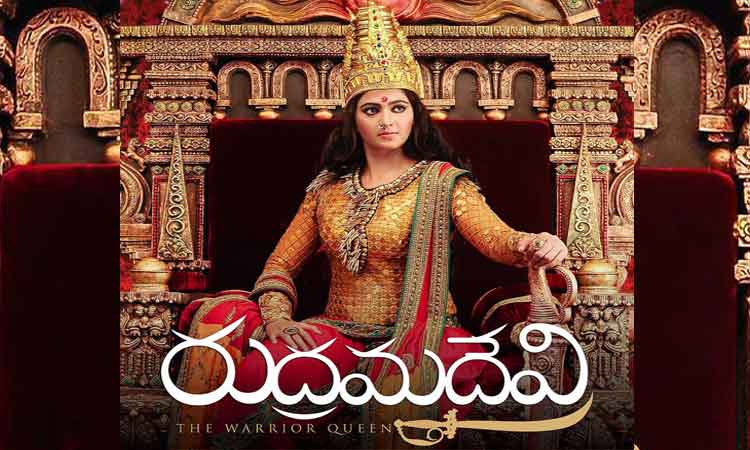Kakatiya Empress Rudhramadevi
- In Movie Reviews
- 07:15 PM, Oct 14, 2015
- Saiswaroopa Iyer
The film on the Kakatiya Empress and the first female ruler in the Telugu history opens with the famed traveller Marcopolo introducing the findings of his travel to the King of Venice. The heirless king is worried about his rivals taking over his throne as he has only daughters and no son. Marco Polo starts recounting the story of Rudhramadevi, the Queen of Kakatiyas where he cites the solution.
It is clear to the viewer that the film was conceived with a passionate reverence to Telugu history. The story of the Queen who faced barrier after barrier, her gender being the only reason is something which every generation needs to hear. This leaves us with a question about why it was not attempted at all in the past. Gunashekhar, the director and co-producer (Story and Screen play too) needs to be given the credit for taking the step.
The story throws light on the rigid gender biases (and a lot more) of the feudal lords, population and the royalty. Rudhramadevi is a Kakatiya princess who is announced to the world as a prince by the King Ganapathi Deva in a move to frustrate his rivals who are waiting to take over the throne if he is left heirless. Shiva Devayya, the minister played by Prakash Raj advises the king to hide the gender of the princess and announce her as the ‘prince’ a closely guarded secret that is known to a select few for 25 years. One can expect the multitude of ordeals that the princess would have faced under the burden. The history is well known and the film has taken a generous amount of creative liberty in re ordering the events (indicated in the disclaimer already).
From the content point of view, the hard work shows. Three aspects that stand out in the film are
1. The amount of emphasis on the ecosystem that supported Rudhramadevi. The minister Shiva Devayya in my view steals the show reminding us about stalwarts in our history like Mahamantri Timmarusu (Appa ji) and Chanakya. Gona Ganna Reddy and Chalukya Veerabhadra are given their due too. (I was never a fan of Allu Arjun and believe me, he does great!)
2. The harsh reality about the gender bias and the commentary around it has been done with a great amount of passion. The population is shown to be easily manipulated by the greedy feudal Lords as they easily forget the developmental works initiated by the princess as soon as they come to know of her gender. It was something that reminded me about the fickle minded public opinion that sways under a stereotypical influence. (A harsh slap we need from time to time). For this reason, I support the initiative to make the film tax free not only in Telangana but in the whole of the country.
3. We see Rudhramadevi cherishing her maidenhood and womanhood albeit in secrecy. She is not seen considering her gender a burden. Heroism is not all about being masculine and about charging on the battle field or taming a wild elephant. I liked the balance and the softer side of Princess Rudhrama and her emphasis on the administrative aspects of ruling over the stereotyped expansive valour.
That said, the music is a huge relief. I can’t exactly say that it was great. I am a bitter critic of music in the current Tollywood and the theatre experience is generally horrible as I cannot forward the song away. Thankfully, the songs are crisp, gel into the story and are over before you get bored. The cast excel in all the roles. I had cherished a wish that Anushka play the role of Rudhrama Devi when I saw her don a brief regal role in the 2009 film Arundhati (horrible film but Anushka had her moments). The costumes are laudable.
The film unfortunately has a good amount of faults for critics to pounce upon. The most putting off aspect is the redundant usage of technology and illogical portrayal of sets. (How the hell does the Seuna King Mahadeva climb up that tower touching the clouds, every time he has to address his soldiers, that too in the age where there were no lifts?). The fight sequences of Rudhramadevi in the final battle are totally unrealistic. Rudramba would have been a peerless warrior, but it does her character a disservice if she is portrayed gliding and flying over hundreds of soldiers with no traces of fatigue. My husband, a non-Telugu did taunt me that ‘my kind’ is not the one that appreciates sane portrayal of any story and this much illogical stuff is needed for any film producer to recover his money. I am sadly left wondering if he is actually right. Being the single man behind the scenes also might have proven to be a fatiguing experience for Gunashekhar.
But for these faults, it is a recommended watch for its sheer content. The film ends with a poster for a sequel "Prataparudrudu, the last Emperor". As a lover of history and with a hope that Gunashekhar learnt his lessons, I await its release.







Comments